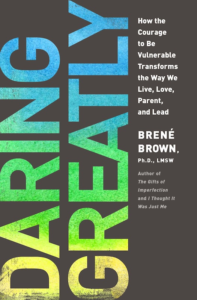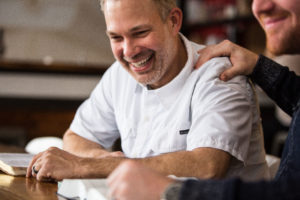Avery Publishing, Penguin Group; 2012
Review by Cherie Tetz-Christensen
Brené Brown is an American scholar, author, and public speaker, who is currently a research professor at the University of Houston Graduate College of Social Work. Over the last fifteen years she has been involved in research on a range of topics, including vulnerability, courage, shame, and empathy. Her TEDTalks “The Power of Vulnerability” and “Listening to Shame” have been viewed over 6 million times. Brown’s book “Daring Greatly” was a #1 New York Times Bestseller.
 This beautiful book borrows from Brené Brown’s extensive research on vulnerability and shame, and her own personal experiences in ways that are profound, candid, and engaging. Daring Greatly is all about the terror and the gifts of vulnerability. Brown’s therapist called it an “exquisite” emotion. Brown prefers the term “excrutiating” – or in her words (and mine): “I frickin’ hate vulnerability!” Every cell in my body resists going there, and yet…
This beautiful book borrows from Brené Brown’s extensive research on vulnerability and shame, and her own personal experiences in ways that are profound, candid, and engaging. Daring Greatly is all about the terror and the gifts of vulnerability. Brown’s therapist called it an “exquisite” emotion. Brown prefers the term “excrutiating” – or in her words (and mine): “I frickin’ hate vulnerability!” Every cell in my body resists going there, and yet…
I discovered many years ago through Spiritual Direction that vulnerability (living honestly with myself, with another, and with God) would be the path of a forever and continuous healing. What a gift it was for me to experience a compassionate, non-judging presence in those moments where I risked “showing up and being seen.” This terrifying invitation to live in an undefended way continues to open me up to a life of more authenticity, wholeness, creativity, and genuine connectedness.
But, in all honesty, I feel scared to death every time I risk it! Every time I take the risk of showing up, just as I am – the lovely and the unlovely me – I notice how frightened I am of looking weak, of asking for help, of being seen as “less than.” As illogical as this is, I’m afraid of being left alone. I’ve discovered deep roots of shame that work hard to stay hidden in the dark.
In Daring Greatly, Brown explores what drives our fear of being vulnerable, how we protect ourselves from it, and the price we pay when we shut down and disengage. Her research on shame explores some of the ways we feel “not enough”, and how this scarcity keeps us from taking the risk of being exposed. She highlights the myths of vulnerability, and goes on to discuss the importance of living our lives wholeheartedly – and what that looks like.
One of the myths of vulnerability that Brown talks about in Daring Greatly is this: “I don’t do vulnerability.” You, like me, might think that as well. You, like me, may have found a zillion ways to protect yourself, and defend against and medicate your uncomfortable and vulnerable feelings. You, like me, might be surprised to learn that despite these efforts, vulnerability drives more of your responses to life than you ever knew! We all do vulnerability! What if noticing these vulnerable moments is the place of invitation? The place where, if I have the courage to show you who and how I really am, I might discover that I am loved. Yes, it’s risky…but, oh, the possibilities!
 It takes courage (again and again and again) to embrace this way of vulnerability. But Brown points out that vulnerability and courage are contagious. Finding people and creating communities where “I can dare to show up, live my uncertainties and take emotional risks” is the only path to feeling connected to our own true essence and creativity – and also feeling connected to the important people and work in our lives. We need one another!
It takes courage (again and again and again) to embrace this way of vulnerability. But Brown points out that vulnerability and courage are contagious. Finding people and creating communities where “I can dare to show up, live my uncertainties and take emotional risks” is the only path to feeling connected to our own true essence and creativity – and also feeling connected to the important people and work in our lives. We need one another!
Another myth of vulnerability that Brown discusses is an idea that shook me to the core: “Until we are receiving with an open heart, we are never really giving with an open heart.” Ouch! I realized some time ago that I’m okay with you not being perfect – but it’s very hard for me to be okay with me not being perfect! It is incredibly humbling to remember that whatever I judge in myself, I am also judging in “the other.” We honestly can’t do this work alone, and therefore I’m not allowed to just be the “one who helps”. I must also be the one who “asks for help.”
I am deeply grateful to have been leaning into these conversations, sometimes with a reluctant vulnerability, in Spiritual Direction and with my Soulstream community, long before I came across Brown’s book. In reading Daring Greatly, it was exciting to hear her saying the same profoundly simple and spiritual truths in a language that appeals to a wide audience.
I love this book and, because we never “arrive”; I know it will be one that I will read and share, again and again. I hope you join me in the conversation.
Cherie Tetz-Christensen will be facilitating a “Book Conversation” about Daring Greatly at Calgary’s FCJ Retreat and Conference Centre, starting Tuesday, March 7, 2017 at 6:30 to 8;30 pm, and continuing for six Tuesday evenings. Visit their website for more information or to register.
To contact Cherie, email her at Cherie.tetz@gmail.com or phone 587-439-8674








Beautifully written Cherie!
Thank you for your longstanding relationship with the FCJ Centre. So appreciated
Beautifully written Cherie and I know that you also live what you write!!
Cherie, in this review you spoke from your heart, and this is what I appreciate so much about you – you are a role model in practicing vulnerability! I am so thankful for Soulstream – a safe place where, learning from people like you, we can be ourselves.
Kasia
What happens when vulnerability backfires and you’re left worse off than before? More shame, more hurt, more misunderstanding. How does one navigate the real estate of vulnerability and not pay too high on commission?
Excellent question, Sandi. From reading Brené’s books, and also from reading an interview she gave on blog.ted.com , I know she says that to risk being vulnerable, we also must get to a place where we understand that our worthiness is a birthright, and not something we have to earn, or keep earning. To quote her in the interview “If you don’t understand shame, and you don’t have some shame resilience and awareness, then you cannot be vulnerable.” She writes that “shame resilience” comes from doing the inner work to understand where the “shame” message we might carry comes from, what drove it, and how it has affected us in the past. She suggests looking at our shame in the eye and saying “Thanks, I appreciate it, but I’m not subscribing anymore. I’ve got a new way of doing things, and maybe you kept me safe and small in the past, but I’m not doing that now.” I know that might take a lot of guts, and a lot of work…but I think it’s worth it. Truly connecting with others on a deep level requires some vulnerability on our part, and it can bring a lot of joy.